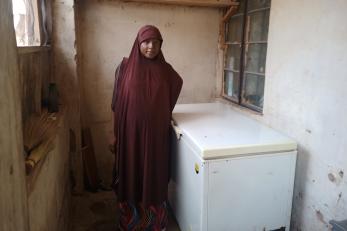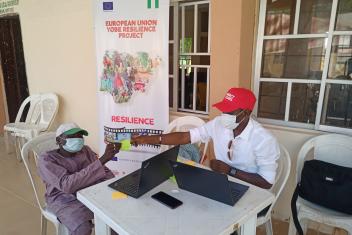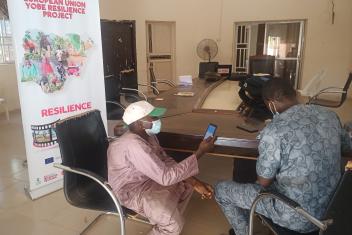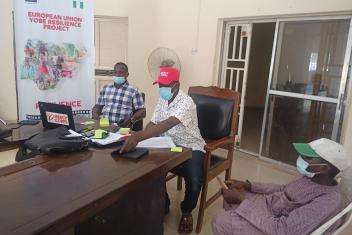Restoring hope for poor vulnerable households through unconditional cash transfers
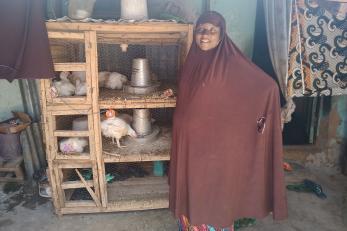
For families recovering from the conflict in Northeast Nigeria without a sustainable household livelihood, it means sometimes going a whole day without a square meal. One of the approaches for supporting vulnerable families is the disbursement of unconditional cash transfers (UCT). This was adopted by the European Union funded Building Resilience in Complex Crisis (BRICC) program in Yobe state.
Ibrahim Yahaya, a religious teacher, and farmer is one of the grateful participants of the program’s UCT. Ibrahim has a big family of two wives and twelve children. Oftentimes, they would go to their farm without any meal for the day.
In his words, “It has been over two months since my family members took a bath using soap and pomade. We depend on dried left-over food which is recooked and mixed with groundnut cake and eaten. Many times, my children and I would go to the farm without eating. The other day, we were so hungry, I was thinking of borrowing 700 NGN from somewhere to buy maize flour and soup items for them to eat, but I didn’t want anyone to expose me for not being able to take care of my family.”
On the day Mercy Corps commenced the disbursement of cash transfer, Ibrahim shares how he got home and was told that Mercy Corps had started giving the cash of 10,000 NGN. “I did not even take my bath, I rushed to the venue and joined the line where my picture was verified, and I was given a small paper (token) after the text message on my phone was confirmed. After receiving my paper, I was told to go to the secretariat to receive my money. I went back home, took my bath, and went straight to the secretariat where I received my 10,000 NGN,” he said.
The poor vulnerable households (PVHHs) who redeemed their vouchers expressed their gratitude to the European Union and Mercy Corps for the timely distribution. Many of them shared that it came at a time when it was most needed, due to the economic hardship being experienced with the high cost of inflation in the state and country at large.
Excited, Ibrahim went on to buy food items for his family; maize flour, palm oil, three bars of bathing soap, and two containers of cream. He also bought firewood and water for preparing their meals. “I am so happy as my family was happy to see how our condition has changed; having good food to eat, taking our baths with soap and rub pomade to our bodies, even buying water for household use for my wives,” he said. With the money he received, Ibrahim was able to seek hospital care for his pregnant wife and procure her drugs, when she was put to bed a week later. “I am so happy for this, my lack was not exposed and I have food in the house now. I am so grateful for this assistance; may Allah guide you and all those supporting you to help us,” he added.
How the unconditional cash transfer process is conducted
Providing succor for persons with disability
Isa Usman, a person living with a disability (a PLWD) informed the Mercy Corps team during a visit to his home that the cash he received was timely as the tricycle which was his source of livelihood broke down and he did not have the money to fix it. He repaired the tricycle with 6,000 NGN from the 10,000 NGN he redeemed. The remaining four thousand was used by him to buy food items for the upkeep of his family (himself, his wife, and little daughter).
“I do not know what I would have done, as I do not know where to get money to fix my Keke (tricycle) which is the source of my daily livelihood. I am grateful to Mercy Corps and the European Union for this assistance given to me and many people in this community, in fact, my neighbor also collected the 10,000 NGN,” shared Isa.
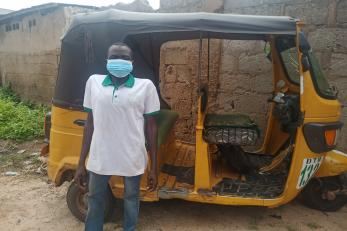
How cash support provides additional earnings for savings investment association members
Murjanatu Ibrahim is a savings investment association (SIA) member, who is also a program participant that received UCT assistance. She was able to expand her poultry business with the investment capital obtained from her SIA group, named Annur SIA. She is a member of the management committee of the group and has really enjoyed being part of the SIA, which is in the second cycle.
Due to the high cost of the day-old chicks as well as the feeds which is now 7,000 NGN as against 3,500 earlier in the year, she bought 15 1-day old chicks and diversified her income generating activity with the inclusion of the sale of cold sachet water and local zobo drink (Hibiscus drink). She was able to get 30,000 NGN as investment capital to add up to 70,000 NGN she earlier set aside which she used to buy a deep freezer for the new business.
In her words, “I sell 30 bags of cold pure water (sachet water bags) every day and I make 3,500 NGN on the sale of my zobo drink. Within a short period, I will be able to recover the money I used in buying the deep freezer. I am happy for being a member of Annur SIA group, as the group has helped me to expand my poultry business and to start the sale of pure water and zobo drink. I used to keep only 40 birds but was able to add another cage and increased the birds to a hundred,” said Murjanatu.
Seeing how her business is faring well, Murjanatu encouraged her neighbor, who is also SIA member to start the poultry business. The lady has also collected investment capital, bought her birds which she sold, and is planning to repair her cage and get another investment capital to buy another set of birds as she is waiting in line for the next investment capital to be given out by the group.
